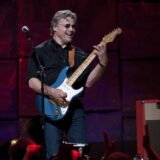2 Top Growth Stocks to Buy With $1,000 Right Now
[ad_1]
The healthcare industry has proved to be a remarkably resilient place for investors. Generally speaking, the kinds of products and services that companies in this space offer are required on a consistent basis. As a result, these businesses are often far less vulnerable to economic fluctuations compared to other industries.
That’s not to say that healthcare businesses haven’t felt the volatility of the last few years, but there’s been a marked difference in the performance of many of these companies that might attract investors looking for steady long-term returns.
If you have $1,000 to invest that you can leave alone for at least several years, here are two such names to consider.
1. Vertex Pharmaceuticals
Vertex Pharmaceuticals (VRTX -0.96%) is not a household name, but it’s making significant strides in disrupting the standard of care for multiple diseases in substantial addressable markets. For years, it’s been known for its cystic fibrosis medicines that are the only drugs approved to treat the underlying cause of this genetic illness.
Just recently, Vertex added a new product to its portfolio with the approval of the CRISPR-based therapy Casgevy. Vertex developed it in partnership with CRISPR Therapeutics, and it is a potential cure for both sickle cell disease and transfusion-dependent beta thalassemia.
Casgevy has been approved in the U.S., the U.K., Saudi Arabia, and Bahrain, and approval is pending with European Union regulators. Vertex is awaiting approval for Casgevy in Switzerland as well, and there are plans to seek approval for the drug in Canada in the first half of this year.
Looking to Vertex’s very promising pipeline, a number of potential blockbusters bear watching. One is a non-opioid candidate for acute pain called VX-548. The drug has shown significant promise across multiple clinical settings, including surgical and non-surgical pain, giving it disruptive potential in a broad total addressable market.
The company is also advancing a few promising candidates into early stage clinical trials. One is a therapy for a type of muscular dystrophy called myotonic dystrophy, which affects about 110,000 patients in Europe and North America but has no approved therapies to treat it.
The other is a treatment for autosomal dominant polycystic kidney disease (ADPKD), which has over 250,000 patients just in the U.S. and Europe. ADPKD is without a cure at this time; the current standard of care for most patients is either dialysis or a kidney transplant.
Vertex has financial strength with billions in profits and revenue flowing in each year, while looking to the future within the rare-disease drug market. This looks like a worthwhile stock to hold for the long run.
2. Regeneron Pharmaceuticals
Regeneron Pharmaceuticals (REGN -0.70%) is a biotech known primarily for two blockbuster drugs. The first is Dupixent, which it developed and markets with Sanofi. The other is Eylea, whose marketing rights it shares with Bayer.
Dupixent is an approved treatment for several conditions, including moderate to severe atopic dermatitis, a chronic skin disorder called prurigo nodularis, and as an add-on treatment for moderate to severe asthma. Eylea is also approved for a variety of ailments including diabetic retinopathy and wet age-related macular degeneration.
Exclusivity for existing Dupixent patents continues until the beginning of the next decade, but approval for new indications could extend the revenue potential of this drug even longer. For example, Regeneron is currently seeking approval for Dupixent as a treatment for patients with chronic obstructive pulmonary disease (COPD) and type 2 inflammation.
COPD patients with type 2 inflammation represent 20% to 40% of the entire COPD patient population. Label expansion of Dupixent for this disease would open up a new addressable market of about 300,000 people.
COPD affects about 12 million patients in the U.S. alone. Last year, Evercore analyst Josh Schimmer wrote in a note that adding COPD as an approved indication for Dupixent could propel sales of this drug to more than $20 billion annually by the end of the decade.
And while Eylea was scheduled to lose patent exclusivity last year, Regeneron’s filing of multiple ancillary product patents meant that its last patent now won’t expire until 2040.
Dupixent drove total global sales of $12 billion in 2023, up 33% from 2022. Meanwhile, Eylea had U.S. product sales of $5.7 billion in the 12-month period. Eylea HD, the higher-dose version of the drug approved last year, brought in sales of $166 million in the U.S. last year.
Looking at Regeneron’s financial performance for 2023, it had $13 billion on the top line, and $4 billion on the bottom line. While that net income figure was down a single-digit percentage year-over-year, revenue was up 8% from one year ago.
Another driver of Regeneron’s 2023 performance was cancer drug Libtayo, also developed in partnership with Sanofi. Libtayo had $869 million in global sales in 2023, a 50% increase from the prior year.
This biotech’s shares earned a total return of about 133% over the trailing-five-year period, about 30% higher than the S&P 500‘s return in that same time frame. Regeneron isn’t a lightning growth stock. But its steady returns, continued profitability, and overall promise of its current and potential products make it a no-brainer buy for long-term healthcare investors.
[ad_2]

















